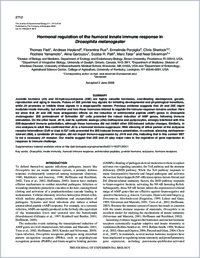Hormonal regulation of the humoral innate immune response in Drosophila melanogaster
- Flatt, Thomas Brown University
- Heyland, Andreas University of Guelph
- Rus, Florentina University of Massachusetts Medical School
- Porpiglia, Ermelinda University of Massachusetts Medical School
- Sherlock, Chris University of Massachusetts Medical School
- Yamamoto, Rochele Brown Univesrity
- Garbuzov, Alina Brown Univesrity
- Palli, Subba R. University of Kentucky
- Tatar, Marc Brown University
- Silverman, Neal University of Massachusetts Medical School
-
2008
Published in:
- The Journal of Experimental Biology. - 2008, vol. 21, no. 1, p. 2712-2724
Drosophila
innate immunity
humoral immune response
antimicrobial peptides
juvenile hormone
ecdysone
hormone receptors
English
Juvenile hormone (JH) and 20-hydroxy-ecdysone (20E) are highly versatile hormones, coordinating development, growth, reproduction and aging in insects. Pulses of 20E provide key signals for initiating developmental and physiological transitions, while JH promotes or inhibits these signals in a stage-specific manner. Previous evidence suggests that JH and 20E might modulate innate immunity, but whether and how these hormones interact to regulate the immune response remains unclear. Here we show that JH and 20E have antagonistic effects on the induction of antimicrobial peptide (AMP) genes in Drosophila melanogaster. 20E pretreatment of Schneider S2* cells promoted the robust induction of AMP genes, following immune stimulation. On the other hand, JH III, and its synthetic analogs (JHa) methoprene and pyriproxyfen, strongly interfered with this 20E-dependent immune potentiation, although these hormones did not inhibit other 20E-induced cellular changes. Similarly, in vivo analyses in adult flies confirmed that JH is a hormonal immuno-suppressor. RNA silencing of either partner of the ecdysone receptor heterodimer (EcR or Usp) in S2* cells prevented the 20E-induced immune potentiation. In contrast, silencing methoprene-tolerant (Met), a candidate JH receptor, did not impair immuno- suppression by JH III and JHa, indicating that in this context MET is not a necessary JH receptor. Our results suggest that 20E and JH play major roles in the regulation of gene expression in response to immune challenge.
- Faculty
- Faculté des sciences et de médecine
- Department
- Département de Biologie
- Language
-
- English
- Classification
- Biological sciences
- License
-
License undefined
- Identifiers
-
- RERO DOC 324338
- DOI 10.1242/jeb.014878
- Persistent URL
- https://folia.unifr.ch/unifr/documents/307675
Statistics
Document views: 195
File downloads:
- Texte intégral: 194
